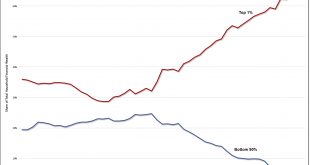Winning! “We’re going to win. We’re going to win so much. We’re going to win at trade, we’re going to win at the border. We’re going to win so much, you’re going to be so sick and tired of winning, you’re going to come to me and go ‘Please, please, we can’t win anymore.’ You’ve heard this one. You’ll say ‘Please, Mr. President, we beg you sir, we don’t want to win anymore. It’s too much. It’s not fair to everybody else.’” Trump said. “And I’m going to say ‘I’m sorry, but we’re going to keep...
Read More »Dirk Ehnts — A short comment on Temin and Vines on Keynes
… For those that want to understand how Keynes is relevant for the 21st century I would recommend reading the original books – now in public domain – or modern books from Post-Keynesian/Modern Monetary Theory authors. econoblog 101A short comment on Temin and Vines on KeynesDirk Ehnts | Lecturer at Bard College Berlin
Read More »Mark Weisbrot — Still Meddling in Venezuela
In recent weeks, the Trump administration has stepped up its efforts at “regime change” in Venezuela.... Gunboat diplomacy in new garb. Why does the US care about Venezuela? Oil, what else? CounterpunchStill Meddling in VenezuelaMark Weisbrot
Read More »David F. Ruccio — “If poor people knew how rich rich people are, there would be riots in the streets”
Chris Rock may be right. Still, Americans are well aware that economic inequalityin their country is obscene, even though they often underestimate the growing gap between the poor and the rich. But it’s Frank Rich, who conducted the interview with the American comedian, who made the more perceptive observation: For all the current conversation about income inequality, class is still sort of the elephant in the room. Occasional Links & Commentary“If poor people knew how rich rich...
Read More »Asia Times — China to follow Elon Musk, build a global Wi-Fi network
More than 300 satellites will be put into orbit as China, inspired by US billionaire Elon Musk’s plan to get the entire world online, aims to establish a global Wi-Fi network of its own. Musk’s Starlink initiative reportedly consists of more than 12,000 interlinked satellites. The state-owned China Aerospace Science and Technology Corporation has been tasked with developing and launching such satellites, the Beijing-based Science and Technology Daily reports.... Asia TimesChina to follow...
Read More »Brian Romanchuk — Back To Gradualism
My reading of the consensus view is that the change in personnel at the Federal Reserve has coincided with a more hawkish outlook, although the tax cut presumably helped push matters. I do not have a strong reason to disagree with such a view; the Fed is probably going to revert back to its historical policy of gradualism -- which was a 25 basis point hike per meeting.... Bond Economics Back To GradualismBrian Romanchuk
Read More »Eric Zuesse – How the US Establishment Lies Through Its Teeth, for War Against Russia
I was brought up on a council estate and it was bit rough. I remember being set upon a few times by gangs when all alone. You look around you and you see that you're encircled and that there is no escape. First they start with the verbal abuse, then one of them starts laying into you before all of them do. I was lucky, after a few punches I would be on the floor defeated and then they would give up after that. The next day I would be okay apart from some bruises and a cut or two.Being picked...
Read More »The world just changed. “Putin did it.”
Sunday reading. LobeLogUnipolar Strategy in a Multipolar World Paul Pillar Une parole francheMissile-gate Gilbert Doctorow | European Coordinator of The American Committee for East West Accord Ltd.Russian and Eurasian PoliticsPutin’s ‘Missile Speech’: Butter, Guns, and Security Discourse Gordon M. Hahn, Expert Analyst at Corr Analytics, http://www.canalyt.com and a Senior Researcher at the Center for Terrorism and Intelligence Studies (CETIS), Akribis Group, www.cetisresearch.org....
Read More »Jeff Desjardins — China’s Staggering Demand for Commodities
>50% of all steel, cement, nickel, and copper goes there Visual Capitalist China’s Staggering Demand for Commodities Jeff Desjardins See also 18 Cognitive Bias Examples Show Why Mental Mistakes Get Made
Read More »Bill Mitchell — Poverty among the unemployment now close to 50 per cent in the EU
Last week, Eurostat released it updated data covering people who are at risk of monetary poverty. In the press release/news page (February 26, 2018) – Almost half the unemployed at risk of monetary poverty in the EU – we learn that 48.7 per cent of unemployed persons in the EU “were at risk of poverty” in 2016, even “after social transfers” were taken into account. The situation has deteriorated significantly since 2005 as a result of the impacts of the GFC and the policy response taken by...
Read More » Mike Norman Economics
Mike Norman Economics


